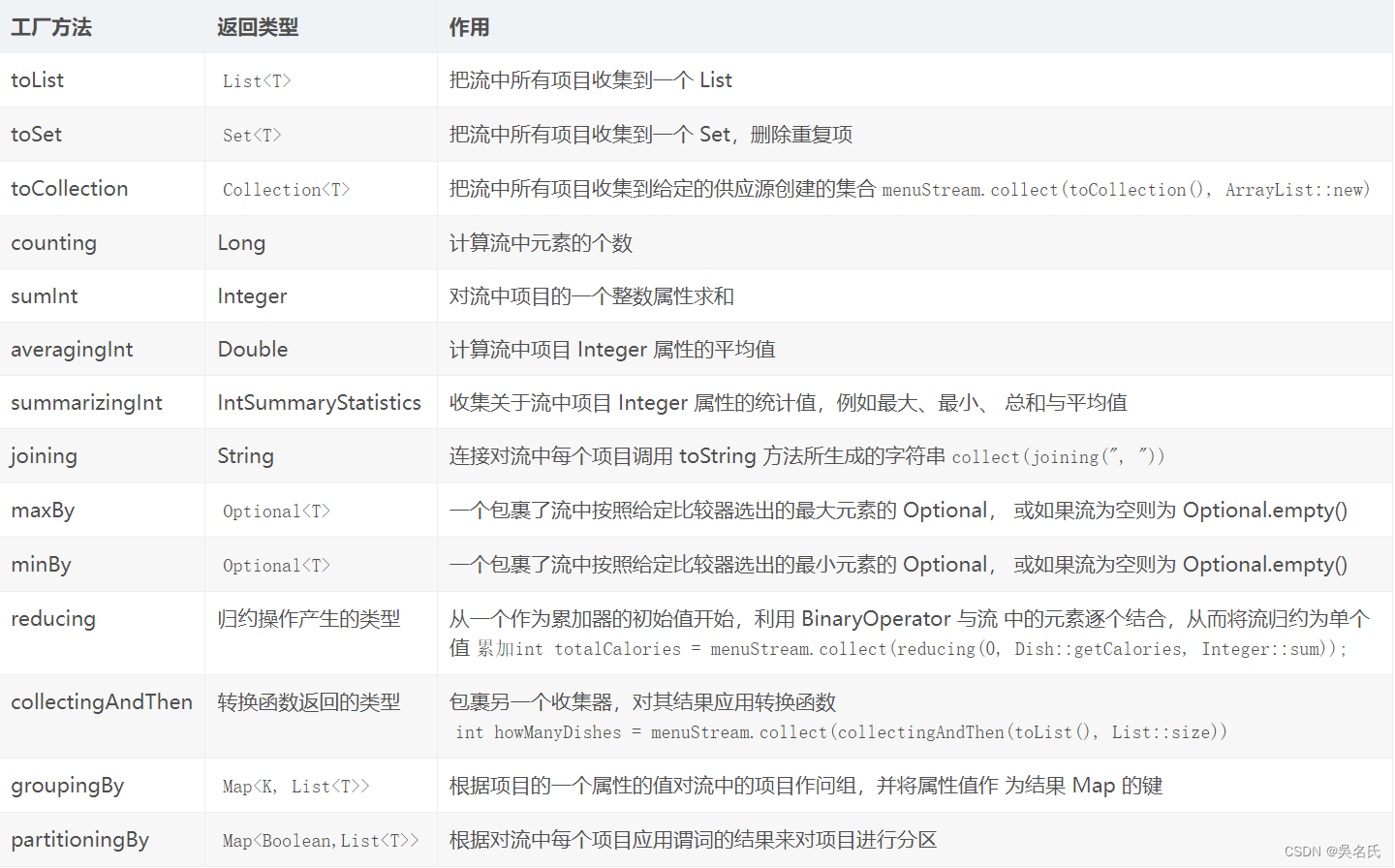Using the new features of java8, some data processing can be realized with concise and efficient code.
1 Data preparation
1.1 Define a Fruit object
package com.wkf.workrecord.work;
import org.junit.Test;
import java.math.BigDecimal;
import java.util.ArrayList;
import java.util.List;
/**
* @author wuKeFan
* @date 2023-03-09 15:07:04
*/
public class PublicTest {
@Test
public void test() {
List<Fruit> appleList = new ArrayList<>();//存放apple对象集合
Fruit apple1 = new Fruit(1,"苹果1",new BigDecimal("3.25"),10);
Fruit apple2 = new Fruit(1,"苹果2",new BigDecimal("1.35"),20);
Fruit banana = new Fruit(2,"香蕉",new BigDecimal("2.89"),30);
Fruit lychee = new Fruit(3,"荔枝",new BigDecimal("9.99"),40);
appleList.add(apple1);
appleList.add(banana);
appleList.add(apple2);
appleList.add(lychee);
}
}
1.2 Add some test data
List<Fruit> fruitList = new ArrayList<>();//存放水果对象集合
Fruit apple1 = new Fruit(1,"苹果1",new BigDecimal("3.25"),10);
Fruit apple2 = new Fruit(1,"苹果2",new BigDecimal("1.35"),20);
Fruit banana = new Fruit(2,"香蕉",new BigDecimal("2.89"),30);
Fruit lychee = new Fruit(3,"荔枝",new BigDecimal("9.99"),40);
fruitList.add(apple1);
fruitList.add(banana);
fruitList.add(apple2);
fruitList.add(lychee);2 text begins
2.1 Grouping
Map<Integer, List<Fruit>> groupBy = fruitList.stream().collect(Collectors.groupingBy(Fruit::getId));
System.err.println("groupBy:"+groupBy);output:
groupBy:{1=[Fruit(id=1, name=苹果1, money=3.25, num=10), Fruit(id=1, name=苹果2, money=1.35, num=20)], 2=[Fruit(id=2, name=香蕉, money=2.89, num=30)], 3=[Fruit(id=3, name=荔枝, money=9.99, num=40)]}2.2 List to Map
The id is the key, and the apple object is the value. You can do this:
/**
* List -> Map
* 需要注意的是:
* toMap 如果集合对象有重复的key,会报错Duplicate key ....
* apple1,apple12的id都为1。
* 可以用 (k1,k2)->k1 来设置,如果有重复的key,则保留key1,舍弃key2
*/
Map<Integer, Fruit> appleMap = fruitList.stream().collect(Collectors.toMap(Fruit::getId, a -> a,(k1,k2)->k1));
System.out.println(appleMap);output:
{1=Fruit(id=1, name=苹果1, money=3.25, num=10), 2=Fruit(id=2, name=香蕉, money=2.89, num=30), 3=Fruit(id=3, name=荔枝, money=9.99, num=40)}2.3 Filter
Filter out eligible elements from a collection:
//过滤出符合条件的数据
List<Fruit> filterList = fruitList.stream().filter(a -> a.getName().equals("香蕉")).collect(Collectors.toList());
System.err.println("filterList:"+filterList);output:
filterList:[Fruit(id=2, name=香蕉, money=2.89, num=30)]2.4 Summing
Sum the data in a collection by an attribute:
//计算 总金额
BigDecimal totalMoney = appleList.stream().map(Apple::getMoney).reduce(BigDecimal.ZERO, BigDecimal::add);
System.err.println("totalMoney:"+totalMoney); //totalMoney:17.482.5 Find the maximum and minimum values in the stream
Collectors.maxBy and Collectors.minBy to calculate the maximum or minimum value in the stream
Optional<Dish> maxDish = Dish.menu.stream().
collect(Collectors.maxBy(Comparator.comparing(Dish::getCalories)));
maxDish.ifPresent(System.out::println);
Optional<Dish> minDish = Dish.menu.stream().
collect(Collectors.minBy(Comparator.comparing(Dish::getCalories)));
minDish.ifPresent(System.out::println);2.6 Deduplication
import static java.util.Comparator.comparingLong;
import static java.util.stream.Collectors.collectingAndThen;
import static java.util.stream.Collectors.toCollection;
List<Fruit> unique = fruitList.stream().collect(
collectingAndThen(
toCollection(() -> new TreeSet<>(comparingLong(Fruit::getId))), ArrayList::new)
);3 The following table shows the static factory methods of the Collectors class
